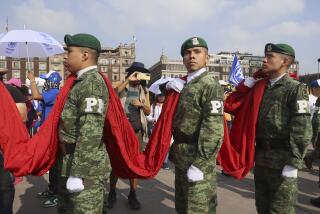Congo Plans Runoff Vote for October
- Share via
NAIROBI, Kenya — A landmark presidential election in the Democratic Republic of Congo is headed for a runoff this fall between two former rebel commanders seeking to lead Africa’s second-largest nation, officials announced Sunday.
But a violent clash during the evening between militiamen loyal to the two candidates heightened fears that the poll will lead to renewed violence.
Joseph Kabila, the current transitional president, led the count from the July 30 race with 45% of the 16.9 million ballots cast, according to preliminary results announced by the Independent Electoral Commission. Jean-Pierre Bemba, one of Kabila’s vice presidents and his chief rival, garnered 20%. The rest of the vote was divided among the other 31 candidates.
Because no single candidate won more than 50%, a second round of voting is slated for October.
Though several candidates have complained about irregularities in the voting and ballot-counting, commission officials said the election was orderly and fair. International observers have generally echoed those sentiments.
Political analysts had long predicted a runoff in the race, given the crowded field of candidates who split the electorate largely along tribal and geographic lines. Kabila dominated polls in his native eastern provinces, while Bemba won in Kinshasa, the capital, and regions of the west, where he was born.
Because both men control large private militias, many observers also feared that if either one lost in the first round, he might be tempted to challenge the results with force. The candidates’ security forces clashed a few times during the campaign, including one incident in July that left at least three people dead.
On Sunday evening, as Bemba was preparing to meet with journalists and give a televised address in Kinshasa, members of Kabila’s 15,000-strong presidential guard reportedly exchanged gunfire with Bemba’s fighters near the electoral commission offices. By nightfall, the streets were empty except for soldiers; sporadic gunfire could be heard into the night.
“There’s a lot of tension and a lot of people with weapons who are not that disciplined,” said United Nations spokesman Kemal Saiki. He said the clashes might reflect the “frustration of those who thought they would clinch it in the first round.”
The much-anticipated announcement of the election results was delayed into the early morning hours today because of security concerns.
In Kinshasa, some residents in recent days fled across the Congo River into the Republic of Congo, fearing violence in the event that a winner was declared. Many expressed fears of a return to war.
“We all must accept the results of the election and be smart about it,” said Jeff Nzadi, a Kinshasa lawyer. “We don’t want to go through another civil war.”
American and U.N. officials have issued stern warnings against candidates who might attempt to act as spoilers. About 17,000 U.N. peacekeepers and 1,000 European Union troops are on high alert around the nation, particularly in the capital and in the volatile northeastern region.
Last month’s poll was the first free election in the Democratic Republic of Congo, formerly known as Zaire, in more than 40 years. The mineral-rich Central African nation endured a 32-year dictatorship under Mobutu Sese Seko. His downfall was followed by a civil war that eventually exploded into a regional conflict that involved 11 African nations and left nearly 4 million dead, mostly from disease and hunger.
In 2003, an internationally brokered transitional government took control with Kabila at the helm.
Some experts said a runoff could be a political boon to budding democracy-building efforts in the country.
“It’s going to force both men to build alliances,” said Caty Clement, the Central Africa project director at the International Crisis Group, a conflict-resolution advocacy organization. “If we end up with two big blocks opposing each other, that’s the idea behind democracy.”
The runoff is expected to heighten tensions between Kabila and Bemba. Kabila is the son of famed rebel Laurent Kabila, who ousted Mobutu. Bemba, whose family grew rich in telecommunications businesses during the former regime, fought against the elder Kabila during the war with backing from neighboring Uganda.
As front-runners, Bemba and Joseph Kabila ran hard-fought campaigns full of ugly personal attacks. Bemba supporters lampooned his 35-year-old opponent as inexperienced and inept, questioning his “Congoleseness” by claiming he was not the true son of Laurent Kabila, who was assassinated in 2001. Kabila supporters accused Bemba, 43, and his soldiers of resorting to cannibalism during the civil war.
Though they’ve shared power in the transitional government, the men had not spoken to each other for more than six months before the election. “There’s no warmth between them,” said Yves Kisonbe, a legal advisor to Bemba.
Both candidates have vowed not to resort to violence.
Political observers said Kabila would face a stiff challenge because his opponents would probably try to join forces to beat him. One such coalition already has been formed, calling itself “Anyone But Kabila.”
“Kabila’s only hope was to win in the first round,” said Remy Massamba, secretary-general of the Union for Democracy and Social Progress, a leading opposition party that boycotted the election because of security concerns.
The race to forge alliances is good news for some who lost, such as Oscar Kashala, a Massachusetts doctor who recently returned to his native Congo to run for president, and Antoine Gizenga, 80, a longtime opposition politician who was the oldest candidate in the race. Both Kabila and Bemba are expected to court the losing candidates in the coming weeks.
*
Special correspondent Isaac Ngwenza in Kinshasa contributed to this report.
More to Read
Sign up for Essential California
The most important California stories and recommendations in your inbox every morning.
You may occasionally receive promotional content from the Los Angeles Times.













